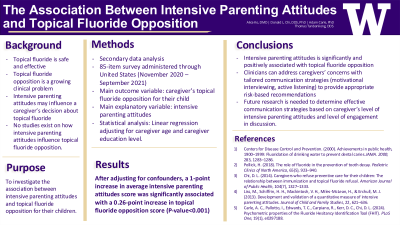Preventive
64 - The Association between Intensive Parenting Attitudes and Topical Fluoride Opposition

.jpg)
Alice Ko, DMD (she/her/hers)
Pediatric Dental Resident
University of Washington, Seattle, WA
University of Washington
Seattle, Washington, United States
Adam C. Carle, MA, PhD
Professor
Cincinnati Children's Hospital Medical Center
Cincinnati Children's Hospital Medical Center
Donald L. Chi, DDS, PhD
Associate Dean for Research, School of Dentistry;
University of Washington, Seattle, WA
University of Washington
Seattle, Washington, United States- TT
Thomas Tanbonliong, DDS
Program Director
University of Washington
Seattle, Washington, United States
Presenting Author(s)
Co-Author(s)
Research Mentor(s)
Program Director(s)
Purpose: The purpose of this study was to investigate the association between intensive parenting attitudes and topical fluoride opposition.
Methods: This was a secondary analysis of data on caregivers’ beliefs about fluoride for their children. An 85-item survey was administered from November 2020 to September 2021 (N=1,135). Participants were eligible if they were an English-speaking caregiver of a child under 18 years. The outcome variable was topical fluoride opposition, defined as how opposed the caregiver was to topical fluoride for their child (self-reported scale of 1-10). The explanatory variable was intensive parenting attitudes, defined as the extent of child-centered, time-intensive, and self-sacrificing parenting, measured as a composite score from three survey items. Linear regression was used to test the study hypothesis, adjusting for confounders. All analyses were performed in SPSS.
Results: The mean±SD caregiver age was 41.7±8.8 years, with most caregivers women (73.0%), white (55.5%), non-Hispanic (79.3%), having greater than a 4-year degree (28.5%), and private dental insurance (45.1%). The mean±SD topical fluoride opposition score was 2.0±3.1, and mean±SD intensive parenting attitudes score was 1.7±0.4. After adjusting for confounders, a 1-point increase in intensive parenting attitudes score was associated with a 0.3-point increase in topical fluoride opposition score (95% CI: 0.1, 0.4; p<0.001). (P < 0.001).
Conclusions: Intensive parenting attitudes are significantly and positively associated with topical fluoride opposition. Clinicians can utilize these findings to assess a caregiver’s intensive parenting attitudes, learn about their concerns, and address them by tailoring communication strategies to discuss appropriate risk-based recommendations about topical fluoride for their child.
Identify Supporting Agency and Grant Number:
The data utilized in this study was supported by grant funding from the National Institute of Dental and Craniofacial Research (NIDCR), grant number #R01DE026741.

.jpg)